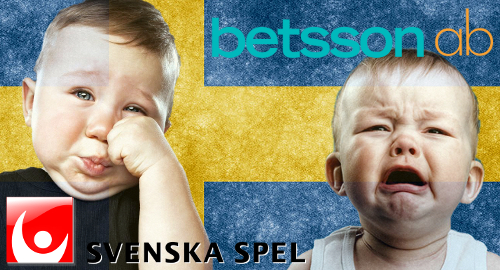 Sweden’s state-run gambling operator Svenska Spel and private rival Betsson AB continue to struggle in their homeland’s new regulated market.
Sweden’s state-run gambling operator Svenska Spel and private rival Betsson AB continue to struggle in their homeland’s new regulated market.
This week, Svenska Spel revealed that its revenue hit just under SEK2.5b (US$255.9m) in the final three months of 2019, around 4% higher than Q4 2018. However, the company enjoyed SEK163m in non-recurring revenue during the quarter, without which its revenue would have fallen 2% year-on-year.
Operating profit fared far worse, falling 36.6% to SEK775m while profit was down by nearly half to SEK667m. The downturn was almost entirely due to the 18% tax that Svenska Spel has been paying on its online revenue since the regulated market launched on January 1, 2019. Svenska Spel’s online revenue was up 8% in Q4 and now accounts for 34% of the overall revenue pie, two points higher than Q418.
Without the impact of the aforementioned one-off items, the Sport & Casino unit saw its revenue rise a mere 2% to SEK661m, while the Tur lottery unit’s revenue fell 1% to SEK1.37b, and the Casino Cosmopol & Vegas land-based gaming unit continued to struggle, falling 10% to SEK443m.
The picture wasn’t much brighter for the full-year figures, which saw revenue fall 4% to SEK8.58b, operating profit fall 45.5% to SEK2.47b and profit slide 40% to SEK2.7b.
Small wonder then, that CEO Patrik Hofbauer called 2019 “the most tumultuous year” in Svenska Spel’s history due mostly to “fierce competition and increased efforts in gaming responsibility.” Hofbauer noted that the entire Swedish market was in negative growth mode in 2019, but claimed Svenska Spel has now ‘stabilized’ its operations and could now adopt “an aggressive focus going forward.”
BETSSON SUFFERS “NOTCH” IN ITS GROWTH CURVE
Speaking of negative growth, Betsson announced Thursday that its Q4 revenue had fallen 10% year-on-year to SEK1.29b, with online casino down 10% to SEK964m and sports betting down 9% to SEK311.6m despite a 15% rise in betting turnover. Earnings were down 30% to SEK292.3m while net income fell 35% to SEK204.4m.
Nordic market revenue was down 32% to SEK450m in Q4, representing 35% of Betsson’s overall revenue pie. Western Europe wasn’t much better, slipping 15% to SEK387.7m. The Central & Eastern Europe and Central Asia segment saved the day, rising 37% to SEK370m.
The full-year figures didn’t offer much solace, with revenue down 5% to SEK5.1b (casino down 6% to SEK3.8b and betting up 2% to SEK1.3b). Earnings slid 18% to SEK1.22b and profit fell 27% to SEK787m.
Betsson CEO Pontus Lindwall noted that his company has traditionally “grown more than the market” but the company “had a notch in this curve” in 2019. Lindwall expressed regret that Betsson had failed to achieve its expected recovery in Sweden before year’s end, in part due to “declining channelization” as Swedish punters seek out better value from internationally licensed sites.
Betsson regretted that operations in Norway and the Netherlands “continued to be weak” but other markets “have performed well.” Betsson continues to seek out greater geographical distribution, as reflected in the company’s acquisition last December of a 75% stake in Brazilian betting operator Suaposta and Lindwall said Betsson was analyzing “several opportunities” in unspecified markets.
As for 2020, Betsson said daily average revenue through February 9 was 6% higher than the company experienced in Q1 2019, thanks in part to “beneficial” sports margins.
